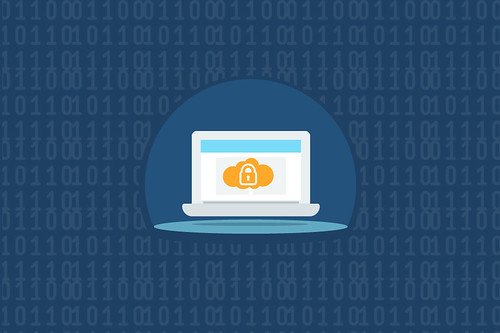Welcome to the era of cloud storage, where our data floats effortlessly in the digital skies. Gone are the days of physical hard drives and cumbersome file transfers – now everything is just a click away, stored securely on remote servers. But wait…can cloud storage really be trusted? Can we sleep peacefully knowing that our precious files won’t fall into the wrong hands? In this blog post, we will delve deep into the world of cloud storage security and uncover whether it’s truly as safe as it claims to be. So fasten your seatbelts and prepare for a journey through cyber space!
What is Cloud Storage?
In simple terms, cloud storage refers to the practice of storing digital data on remote servers accessed via the internet. Instead of keeping your files solely on your local device, you can upload them to a secure virtual space provided by service providers like Google Drive, Dropbox, or Microsoft OneDrive.
The beauty of cloud storage lies in its convenience and accessibility. Gone are the days when you had to carry around USB drives or worry about losing important documents if your laptop crashed. With cloud storage, all you need is an internet connection and a few clicks to access your files from anywhere in the world.
Cloud storage offers scalability as well. You can easily expand your storage capacity without having to invest in physical hardware upgrades. This flexibility makes it ideal for both individuals and businesses with fluctuating data requirements.
But how exactly does it work? When you upload a file to the cloud, it gets broken down into small pieces called “chunks.” These chunks are then encrypted with complex algorithms before being distributed across multiple servers located at different geographical locations. This redundancy ensures that even if one server fails or gets compromised, your data remains intact.
While cloud storage may seem like magic, it’s essential to understand that there are inherent risks involved too. In the next section, we’ll explore both the benefits and potential dangers associated with using cloud services for storing our valuable information.
The Benefits and Risks of Using Cloud Storage
Cloud storage has revolutionized the way we store and access our data. With its numerous benefits, it’s no wonder that more businesses and individuals are embracing this technology. One of the major advantages of using cloud storage is its convenience. Gone are the days when you had to carry around physical hard drives or USBs to access your files on different devices.
Cloud storage allows you to access your data anytime, anywhere, as long as you have an internet connection. This flexibility is especially beneficial for remote workers or people who frequently travel. Additionally, cloud storage offers unlimited scalability, meaning that you can easily increase or decrease your storage capacity based on your needs.
Another advantage of using cloud storage is its cost-effectiveness. Instead of investing in expensive hardware infrastructure, companies can simply pay for the amount of storage they need on a monthly basis. This eliminates upfront costs and reduces maintenance expenses.
However, with the benefits come risks that cannot be ignored. The main concern when it comes to cloud storage is security. Storing sensitive information on a third-party server raises concerns about unauthorized access and data breaches.
While reputable cloud service providers implement robust security measures such as encryption and multi-factor authentication, there is always a risk of hacking or insider threats. It’s crucial for users to take additional steps to secure their own data by setting strong passwords, regularly updating software applications, and being cautious with sharing credentials.
Another risk associated with using cloud storage is reliance on an internet connection. Without internet connectivity, accessing or uploading files becomes impossible until the connection is restored.
Common Myths about Cloud Storage Security
When it comes to cloud storage, there are a lot of misconceptions floating around. Let’s debunk some common myths and set the record straight.
Myth #1: Cloud storage is not secure.
One of the biggest concerns people have about using cloud storage is that their data will be vulnerable to hackers. However, reputable cloud service providers invest heavily in security measures such as encryption and access controls. In fact, many experts argue that storing your data on a reliable cloud platform can be safer than keeping it on local devices.
Myth #2: All cloud storage services are the same.
Not all clouds are created equal. There are various types of cloud storage services available, each with its own level of security and features. It’s crucial to do thorough research before choosing a provider to ensure they meet your specific needs and offer robust security protocols.
Myth #3: Backing up data in the cloud means losing control over it.
Some individuals worry that by entrusting their files to a third-party provider, they relinquish control over their data. However, reputable providers typically offer user-friendly interfaces and tools that allow you to manage your files easily while maintaining full control over who has access to them.
Myth #4: Cloud storage is too expensive for small businesses or individuals.
In reality, cloud storage can often be more cost-effective than traditional methods such as maintaining physical servers or external hard drives. Many providers offer flexible pricing plans tailored for different budgets and needs, making it accessible for both individuals and businesses of all sizes.
By dispelling these myths surrounding cloud storage security, we can better understand its potential benefits without being hindered by unfounded fears. Remember always to choose a reputable provider with strong security measures in place – this way, you can enjoy the convenience and peace of mind that comes with utilizing this innovative technology.
Steps to Secure Your Cloud Storage
When it comes to storing your valuable data in the cloud, security should always be a top priority. While there are risks involved with using cloud storage, there are also steps you can take to ensure that your information remains secure.
1. Strong Passwords: One of the simplest yet most effective ways to protect your cloud storage is by using strong passwords. Avoid common phrases or easily guessable combinations and opt for long, unique passwords that include a mix of letters, numbers, and symbols.
2. Two-Factor Authentication: Enable two-factor authentication whenever possible. This adds an extra layer of security by requiring a second form of verification, such as a code sent to your mobile device or fingerprint recognition.
3. Encryption: Encrypting your files before storing them in the cloud provides an additional level of protection against potential hacks or breaches. Look for reputable encryption software or services that offer end-to-end encryption.
4. Regular Updates: Keep your devices and apps up-to-date with the latest patches and updates from manufacturers and providers. These updates often contain important security fixes that address vulnerabilities in the system.
5. Use Trusted Providers: Choose reliable and reputable cloud storage providers who prioritize security measures and have a strong track record in protecting user data.
6. Backup Locally: In addition to storing data on the cloud, consider making regular backups on local devices or external hard drives as an added precautionary measure against potential data loss due to hacking incidents.
By following these steps, you can significantly enhance the security of your cloud storage and minimize any potential vulnerabilities that may exist within this technology-driven world we live in today.
Case Studies: Real-Life Examples of Cloud Storage Hacks
Cloud storage has become an integral part of our lives, allowing us to store and access our data effortlessly. However, like any technology, it is not immune to security breaches. Let’s delve into a few real-life examples that illustrate the potential risks associated with cloud storage.
One notorious case involved a popular social media platform where hackers gained unauthorized access to millions of user accounts by exploiting weak security measures in their cloud storage infrastructure. This incident highlighted the importance of implementing robust encryption protocols and multi-factor authentication for heightened protection.
In another instance, a renowned e-commerce company fell victim to a targeted attack on their cloud storage system. The cybercriminals managed to infiltrate the network by exploiting vulnerabilities in outdated software and gained unrestricted access to sensitive customer information. This breach emphasized the significance of regularly updating software applications and promptly patching any identified vulnerabilities.
Furthermore, even government institutions have faced significant data breaches through compromised cloud storage systems. These incidents underscored the need for stringent access controls, continuous monitoring, and regular audits to mitigate potential risks effectively.
These real-life cases serve as stark reminders that no organization or individual is exempt from the risk of hacking when utilizing cloud storage solutions. It emphasizes the necessity for proactive measures such as implementing strong passwords, conducting regular security assessments, educating users about best practices, and adopting advanced threat detection tools.
By learning from these case studies, we can better understand how crucial it is to prioritize cybersecurity when utilizing cloud storage services. As technology continues to evolve rapidly, staying one step ahead in terms of security measures becomes paramount in safeguarding our valuable data against malicious attacks.
How to Protect Your Data from Being Hacked
When it comes to securing your cloud storage, there are several steps you can take to minimize the risk of being hacked. First and foremost, choose a reputable cloud storage provider that prioritizes data security. Look for providers that offer strong encryption protocols and have a track record of implementing robust security measures.
Next, make sure to use unique and complex passwords for all your accounts. Avoid using easily guessable passwords such as “123456” or “password.” Instead, opt for long passwords that include a combination of uppercase and lowercase letters, numbers, and special characters.
Enabling two-factor authentication (2FA) is another effective way to protect your data. With 2FA enabled, you will need to provide an additional verification code in addition to your password when logging into your cloud storage account.
Regularly updating your software and operating systems is crucial in maintaining the security of your data. Software updates often include patches for known vulnerabilities that could be exploited by hackers.
Furthermore, be cautious about the files you upload onto cloud storage platforms. Avoid storing sensitive information such as financial records or personal identification documents unless absolutely necessary. If you must store sensitive data on the cloud, consider encrypting it before uploading it.
Regularly monitor activity on your cloud storage account. Check for any unauthorized access attempts or suspicious activity logs. By staying vigilant and proactive in protecting your data, you can greatly reduce the chances of falling victim to hacking incidents.
Remember: always prioritize security when utilizing cloud storage services!
Future of Cloud Storage Security
As technology continues to evolve at a rapid pace, so does the need for robust and advanced security measures in cloud storage. The future of cloud storage security holds both promises and challenges as we strive to protect our data from ever-evolving threats.
One key aspect of the future of cloud storage security is the development of stronger encryption techniques. With quantum computing on the horizon, traditional encryption methods may become vulnerable to attacks. To combat this, researchers are working tirelessly to develop post-quantum cryptography that can withstand these advanced threats.
Additionally, we can expect to see advancements in multi-factor authentication (MFA) becoming more prevalent in cloud storage systems. MFA adds an extra layer of protection by requiring users to provide multiple forms of identification before accessing their data. This could include something they know (like a password), something they have (like a physical token or smartphone), or even biometric information like fingerprints or facial recognition.
Machine learning and artificial intelligence (AI) will play a significant role in improving cloud storage security as well. These technologies have the potential to analyze vast amounts of data and detect patterns that humans might miss. By leveraging AI algorithms, cloud providers can proactively identify suspicious activities and prevent potential breaches before they occur.
Furthermore, blockchain technology may revolutionize how we secure our data in the cloud. Blockchain’s decentralized nature makes it extremely difficult for hackers to tamper with stored information without leaving traces behind. Implementing blockchain-based solutions within cloud storage systems can enhance data integrity and provide an additional layer of trust.
However, despite these advancements, new challenges will inevitably arise as cybercriminals continue finding innovative ways to breach security defenses. As such, continuous research into emerging threats and proactive measures will be crucial in staying one step ahead.
In conclusion,
the future looks promising for improving cloud storage security through innovations such as stronger encryption techniques, multi-factor authentication, machine learning, artificial intelligence, and blockchain technology.
Conclusion
In today’s digital age, cloud storage has become an essential part of our lives. It offers convenience, accessibility, and scalability that traditional storage methods simply cannot match. However, concerns about the security of cloud storage remain a constant topic of discussion.
While no system is completely immune to hacking or data breaches, it is crucial to understand that cloud storage can be made significantly more secure by following best practices and taking appropriate precautions. By understanding the benefits and risks associated with using cloud storage, debunking common myths surrounding its security, and implementing stringent security measures, individuals and businesses can minimize the chances of falling victim to cyberattacks.
Remember to choose reputable cloud service providers that prioritize data encryption and offer robust access controls. Regularly update your passwords and enable two-factor authentication for an extra layer of protection. Additionally, regularly monitor your account activity for any suspicious behavior or unauthorized access attempts.
It is also important to educate yourself on emerging threats in the world of cybersecurity as hackers continually evolve their tactics. Stay informed about new vulnerabilities or exploits that could potentially impact your chosen cloud service provider.
As technology advances further into the future, so too will the security measures designed to protect our precious data stored in the clouds. With advancements like artificial intelligence-powered threat detection systems and blockchain-based encryption protocols on the horizon, we can expect even stronger safeguards against potential attacks.
In conclusion (without saying “in conclusion”), while there are inherent risks involved with utilizing cloud storage services, when approached with caution and implementing proper security measures from both users’ end as well as service providers’, it remains a viable option for storing valuable information securely online.
So next time you hear someone asking whether or not cloud storage can be hacked – remember this article! Cloud storage may not be perfect but by being proactive about protecting your data through education and taking necessary precautions – you can enjoy all its benefits without constantly worrying about falling prey to malicious actors lurking in cyberspace!







